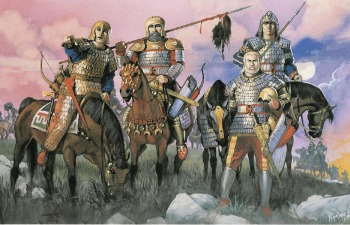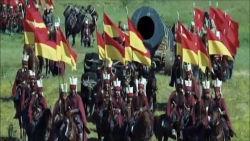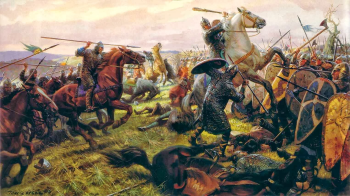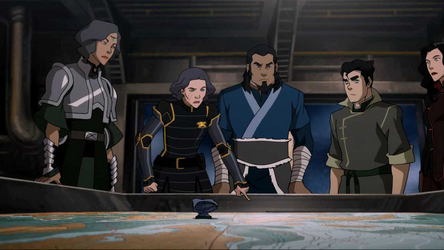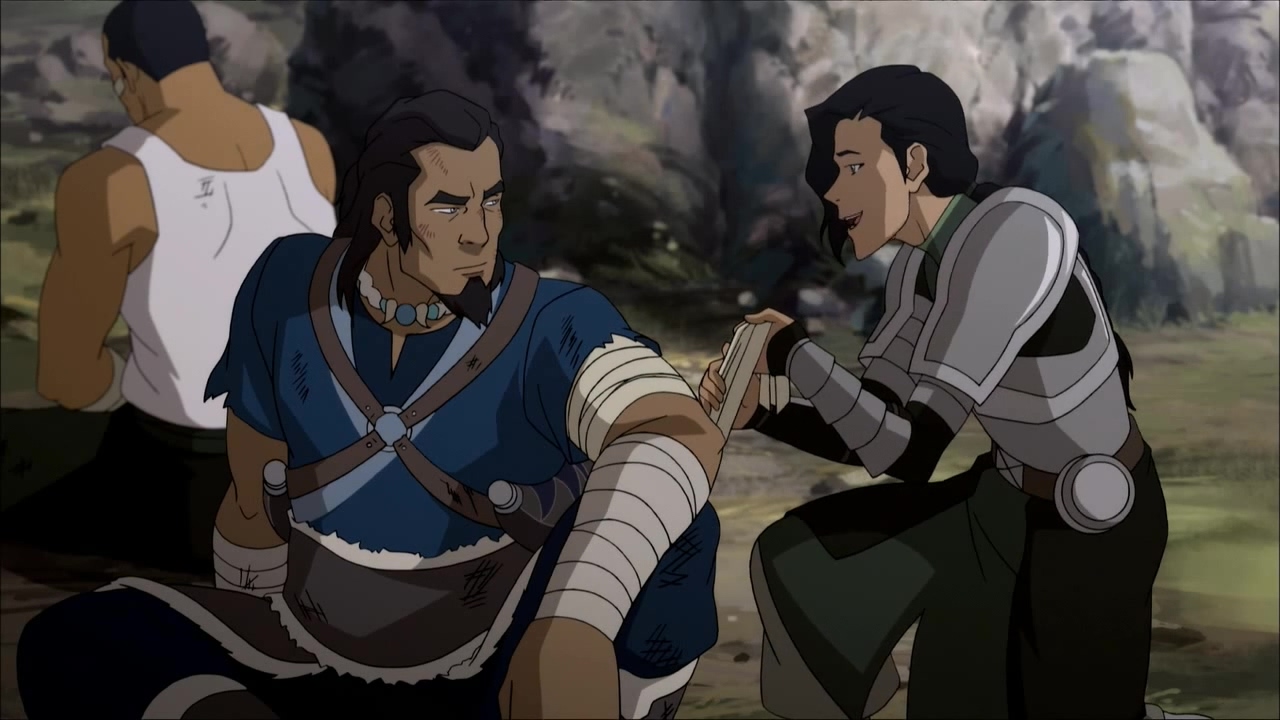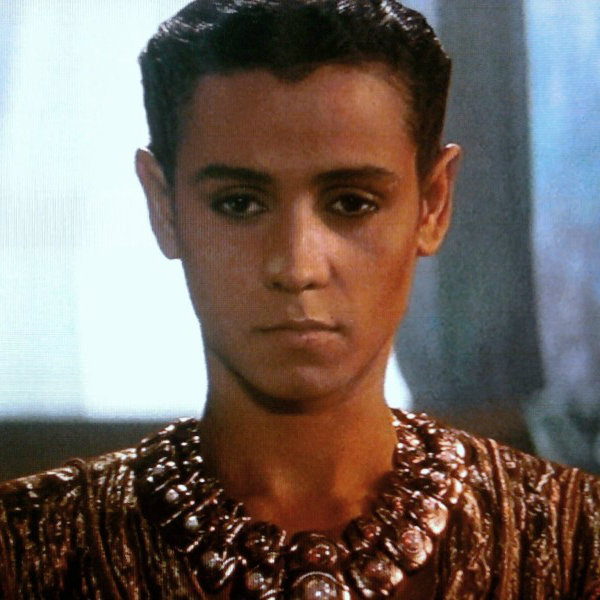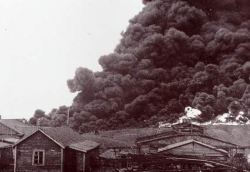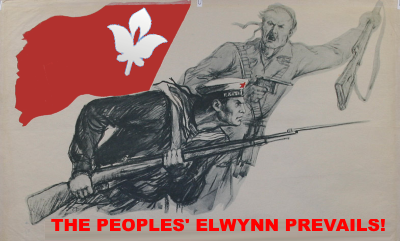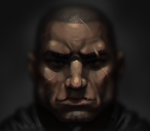History of Elwynn
A History of the Elwynnese Union from the earliest times up until the year 1623 (Elw Calendar) and the beginning of the current era. Written 'in-sim' and from a secular perspective, accounting for religious beliefs and interpretations where known or advised of. Hyperborean events are mostly excluded except where they impact upon the mainland. Similarly the overseas realms incorporated into the Elwynnese Union are only to be addressed when of relevance during the independence era.
Authorship
The History of Elwynn was first written down by the Irijah Prosper Arturion (1545-1624), a noted scholar and antiquarian famous for his boast of visiting each and every single one of the Bailiwicks of the Elwynnese Union.
His life's work was mostly a continuation and elaboration of the Histories of Ric Lyon interwoven with anecdotes relating to the various towns. After his demise the manuscript was unfortunately lost, however the Vice-Dean of the Library and academicians of the Alôqoqar Etâqon Adurellion are attempting a reconstruction of the work based upon the accumulated mass of research notes and the charred remains of the original tome.
History
Antiquity
In mythology Utas, the Treesian God of Light, was believed to have brought the deity known as Elwynn to this area, which since ancient times is considered the primary source of the River Elwynn. Tradition attributed to him also the construction a tower at a spot of the banks of the aforesaid Great River of Benacia to protect the Goddess from the attentions of her twin brother Lest. The Tower of Araxion, named after its site is noted for its prehistoric foundations and as such can be considered one of the earliest stone structures on the continent.
There is some belief amongst Antiquarians and Ethnographers that the legends that have grown up around the Tower are a reflection of the role Araxion played in the prehistoric development of the proto-Elw 'Culture Groups'. It was from this ancestral homeland that the Elw, first as hunter-gatherers and then as pastoralists, would eventually expand outwards to dominate the north of Benacia, and in so doing give rise to the myriad tribes and warbands that would cause the early Shirerithian Kaisers such consternation that they were obliged to site their Imperial Capital at Shirekeep in order to defend and ultimately - at the expense of much blood and treasure - pacify the region.
Cimmerians, from the islands of Cimmeria on the north-eastern shore of Benacia, attacked Elwynn with increasing frequency and held various points along the northern coast. This went back and forth for a while until Cimmeria was granted county status as part of Hyperborea.
Mediaeval Period
1356: Kaiser Raynor I unites Brookshire and Goldshire, invades Elwynn. In the Battle of Shirekeep, he occupies the Elwynn fork. Elw tribes bravely battle on.
1443: Imperial Republic of Shireroth founded with Erik II as kaiser.
1452: Duchy of Elwynn established, initially known as Northshire and not extending far beyond a fortified pale (area enclosed by a palisade) around Shirekeep.
1454: Scott of Hyperborea becomes the first Duke of Elwynn.
1469: Hyperborea annexed to Elwynn as barony.
1470: Ivan Ventura ascends the Ducal Throne of Elwynn.
1471: Duke Ivan is deposed by Scott of Hyperborea.
1476: Mari Greenwood succeeds Sirithil nos Fëanor as Duchess of Elwynn.
1478: Eros Darkstar appointed Bard of Elwynn. Hyperborea under Kalir Sethan reaffirms its allegiance to Elwynn and Duchess Mari Greenwood.
1484: First elections held in Elwynn. Austi Scot, baron of Novi Dalmacija, builds a statue in honour of Mari Greenwood in Novi Dalmacija.
1487: Kaiser announces plan to demote Elwynn from duchy-status to barony-status and give Hyperborea duchy-status. The Duchy government completely rejects the plan. Hyperborea offers compromise. Kaiser rejects compromise and reiterates his plan. Landsraad votes to demote Elwynn. Elwynn established as barony under the Duchy of Hyperborea.
The reduction of the Elwynnese nobility during the wars of conquest, the introduction of the Elfinshi under the nos Fëanor and Greenwood dynasts during the 1470's followed by the subsequent downfall of those Elvish houses during the looming Babkhan era would play a key part in forming the ultimately egalitarian nature of the Elw majority. The destruction of the indigenous landowning and warrior castes prevented the formation of a stratified aristocracy and led to the significant noble families that arose in the subsequent eras, Kalir, Osman, Ettlingar Freyu (Hyperborean, Babkhi and Froyalanish respectively) deriving from immigrant stock.
1st Babkhan Era
1488: Mari Greenwood abdicates in favour of Ardashir. First Babkhi epic on Lest published. Great Osmanid Charter proclaimed. Greenwood and entourage emigrate to Delvenus. Order of the Dead Stag established. Capital punishment reinstated, Hyperborea responds by putting Ardashir under house arrest and overturning all baronial laws, then occupying all of Elwynn. Civil War ensues. The Duke Rulak of Hyperborea (Locke) then further dissolves the Order of the Dead Stag. The Babkhan Shah made a diplomatic protest on behalf of his kinsman and the Kaiser responded by saying it's a ducal matter, pledges neutrality. Considered the year of Elfinshi genocide.
1489: Cease-fire called by Ardashir. Elf molestations, kitten drownings and puppy burnings are all halted (or at least suspended for the moment). Ardashir's rule restored.
1494: Donation of Elwynn. Temples of Cedrist worship to Ryvenna and B'caw established in Elwynn. Today's Ryventemple and B'cawshrine.
1495: Halluci dragons are battered by multi-national artillery before the East Elwynn Sluices, flee into Goldshire.
1496. Diplomatic crisis with Goldshire over the White Elwynn. Baron blames Goldshire for river piracy, orders cleansing of river.
1497: Military engagements with Goldshire.
1500: Elwynn is transferred to Arminian rule under the Barony of Hurmu.
1501: Harald of Ettlingar Freyu is named Baron of Hurmu by Duke Johanns of Arminy, thus becoming the liege lord of the County of Elwynn.
1502: First mention of the emergence of cults that would later form the Holy Church of the Divine Icebear.
1504: Elwynn becomes a Barony under Brookshire as the Barony of Elwynn and Lac Glacei, with David Northworthy Beckford as its Baron.
1506: Genocide reconciliation and commemorations begins in Richard Lyon's tour d'Elwynn. 1508: Richard Lyon succeeds David Northworthy Beckford as Baron of Elwynn and Lac Glacei. Umra Mosque opened in Eliria. Yardistan declares war on Elwynn for lack of collective punishment against the Babkhi community for the Elfinshi genocide. Baron Lyon forms militia. Halluci mass immigration to Illumination begun (along with dragons).
1509: Elwynnese borders closed to all but citizens of Elwynn, Lac Glacei, Brookshire, Amity, Mirioth, the Grand Commonwealth, Stormark, Cranda and Hallucination. County of Port Illumination established. Amir Osmani makes the Triumphant Folk speech, calls for boycott of Brookshire (under which Elwynn is a barony). Lesser Zjandaria established as Babkhi county (Ardashirshahr, Caligae and Vijayanagara Communes). Lady Vesteralen made a citizen of Elwynn (Not Shireroth) by Baron Lyon, provokes imperial government and married her. Elwynn raised to duchy, celebrations across the country, meanwhile protests in other parts of Shireroth against the foreignness of Elwynn, boycotts of Elwynnese products. Peace treaty between Yardistan and Elwynn.
1510: Duke holds discussion with nobles whether to join MSX (a flawed but briefly popular banking system), gets Imperial Smackdown (a form of direct intervention popular in the autocratic period). Creation of Counties of Lac Glacei, Araxion, Eliria and Utasia, and Íseirdia-la-Vraulalennir. Count Ozarka sues and indicts Lord Bill of Antya over a sexual slur. Chief Justice Davis hears case, then leaves it for lacking merits. Cease and desist order from Kaiseress Semisa on Vasroie's activities (Matthew Basil. Co-Baron of Port Ill. Byz.).
1511: Lac Glacei ceases to be a part of Shireroth, and as a consequence ceases to be a part of the Duchy of Elwynn too, under the provisions of the Centerflying Treaty.
1512-1513: The first and most serve of the Hunger Famines that would blight rural Elwynn during the course of the next two decades.
1514: Chief Justice Rob Davis dies.
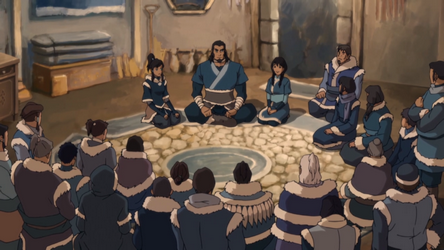
1516: Harald of Ettlingar Freyu is granted the County of Wintergleam by Kaiser Alejian II. In exchange for the county grant the former builds the latter a castle-like house on the coast of Wintergleam, which is to this very day known as Alejian Castle.
1526: Andelarion inherits the throne of the Kingdom of Babkha as "Rashid Shahanshah".
1530-1533: The growth of absentee landlordism, endemic corruption and a generally pervading sense of lawlessness began to undermine the successes of the First Babkhan Era; a loss of confidence in Ducal authority combined with a series of disastrous harvests prompted by a devastating crop blight led to the Great Famine of Elwynn, which although less severe than the first Hunger Famine was more protracted in duration and keenly felt.
The circumstances of the first Babkhan wave of mass settlement in Elwynn remains a subject of some controversy. The present consensus of the Academy is that it came about as a consequence of a conspiracy of Ard-Baron Zirandorthel of Treesia and Sagart Siskind to strike a blow against the Soloralist faith beloved of the Elfinshi ruling classes and so clear a path for the revival of Treesian Unorthodoxy. The first stage was to convince the Kaiser to demote the Duchess, Mari Greenwood, to the rank and title of baroness, and to raise the Hyperboreans up to the dukedom in Elwynn's place. Kaiser Mors III readily acceded to this, harbouring his own dark suspicions about the loyalty of the Elvish race. In the face of Mari Greenwood's fulsome protests Elwynn was reduced to a vassal of Hyperborea. The next step was to find an external force to deliver the coup de grace to the Elves, a force that would neither tarnish the moral superiority of the Hyperboreans nor embroil Treesia openly with the dangers of Imperial politics.
Babkha and Treesia had been in a state of protracted warfare since a Babkhan conquest of the Fifth Isle was narrowly thwarted by a multinational coalition during the War of the Orchid, the conflict which some maintain inspired the creation of the Book of the Orchids, so it would not immediately seem likely that the Treesians and Hyperboreans would chose their most prominent adversary to be the agent of their work in Elwynn.
This was however the era of the 'Babkha-e Jihad', where the Babkhans had celebrated narrowly avoiding destruction in a Cold War with Tymaria by, with characteristic modesty, attempting to conquer the rest of the world, or at least those portions of Micras that were not adequately defended or closely watched. It would not take much inducement to tempt the Babkhans to enter the land of Elwynn and once events took their inevitable course (to quote Scott Alexander: "Wherever there are Babkhans, and people who are not Babkhans, there will be war") the paladins could be unleashed to restore order in the land once the Babkhans and the Elfinshi had reached a point of mutual exhaustion.
In this expectation was however confounded by the speed with which the demoted Duchess Mari Greenwood yielded power to the Babkhans led by Ardashir Osmani. Her reasons for yielding so quickly, in fact at all, have never been satisfactorily explained. On the one hand Ardashir was quite free with blandishments and promises regarding the future prosperity and integrity of the realm - promises he could scarcely have intended to honour - that may have convinced her of his could faith. It was expected at the time that her choice of human successor would have been the loyalist Dāwîḏ of Bekkrfurd, known to history as the Conglacio. Bribery and seduction were also hinted at, although considering the character of the new heir-designate the latter recourse has been deemed by many to be quite unlikely. Indeed it is entirely possible that she lacked a sound judgement of character or that she wished to find a way to punish Shireroth for her demotion.
For these reasons therefore, Boreal-Treesian connivance, Elfinshi acquiescence and the hopes of the populace, that saw Baron Ardashir accorded a Joyous Entry into the city of Eliria and a ceremonial exchange of the baronial regalia with the departing Baroness Greenwood that formed, in a distant and remote way, an influence on the subsequent traditions of the Redizarai that has been revived and modified in the Froyalanish era. Indeed it may be speculated that many of the rituals that have proliferated around the Redizarai have been added with the intent of preventing a recurrence of this single most decisive and divisive event in Elwynnese history.
There was however a complication that threatened to unhinge matters. The vast majority of the interior of Elwynn was forest but of a hollow variegated sort. The forest was streaked through with tracts of farmland. Between the two rivers of Elwynn laid any number of villages, hamlets and homesteads, and in truth no one had ever bothered to conduct a census or audit in those parts. Nonetheless those peasants who had been previously endured forced corvée and regular tithing by the Elfinshi now anticipated the most generous democracy and automatic presumption of all their rights to life and property now that the old regime was coming to an end and a new human led government was promised to enter the land. It made now odds that the peasants desired reforms that would see them owning land that the new Baron wanted for his own interests. These were the early days when a new hope had been kindled that had yet to sour. Small wonder then that the vast majority of the population rose up in revolt before the second week of the Baron’s reign was past. The object of their fury being the Elfinshi landowning classes that had not yet seen the writing on the wall that their time was done and it would be prudent to quit their treetop manor halls.
The Baron Ardashir Khan Osmani spent the month after the securing of Elwynn from his predecessor deeply involved in the wholesale clearance of the landed smallholders from the lands which he had designated as afforested, that is to say designated as his own to the exclusion of all others. The forests were his exclusive hunting preserve and recreational areas, making up now the greater portion of his domain, and this was the publicly acknowledged reason for their existence. Much more important than this however was the fact that they gave the Baron pre-emptive control over land – the most precious resource of an agrarian society. The afforested lands of Elwynn were much more than a baronial playground however; forestland was a source of easy revenue and could be farmed out to the highest bidder. Additionally, venison and other forest products were now at the Baron’s disposal – whether as concessions to loyal members of his retinue or to be sold as cash commodities.
It becomes apparent however that, in the earliest days of the new reign at least, the intentions of the new Baron were not necessarily genocidal in their intent. In that land that had been afforested by the Great Osmanid Charter, the Baron had assigned himself the prerogative to apply his will in as arbitrary a way as he saw fit, not in accordance to the model of Common Law that he had established in the Magistracy, a narrow belt of land along the East and West Elwynn rivers up to the border with the Shirekeep. This enabled his officers to deal severely with poachers, which allowed the Baron and his henchmen to take drastic action against any outlaws lurking in the forests. As news of murdered Elfinshi, hall-burnings and tree-toppling reached the Baron and his retinue. Ardashir, at the stroke of a pen, took the Zurvan given opportunity to outlaw the entire population of those mutinous manor villages and townships whom he wished to evict and supplant with his own followers. Such it was that the butchery began. The main target of this land clearance was southern regions of what would become Lesser Zjandaria but which were at the time still known as Northshire after the initial holdings of the Shirerithians in their conquest of the north. The reasons for choosing this land had mostly to do with its comparative fertility, good river trading links and proximity to Shirekeep, which Ardashir especially hoped would allow him to acquire in time a strategic leverage over the Kaisers.
When the farmers began to beat their ploughshares into swords and when the herdsmen turned their rifles away from the wolves that preyed on their flocks and instead trained them on the villains in the Baron’s employ it appeared as if Ardashir was going to be swept from Shireroth within a matter of days. Indeed as far as the natives were concerned it was as though the Elfinshi Rochben and squires who had so recently and so arrogantly rode in amongst them had disappeared and they were in no mood to accept foresters and bailiffs arriving in their stead.
Presumptuously the leading representatives of the peasantry came together, along with - ironically enough - such elves as had not been wise enough to migrate to Delvenus with the erstwhile Baronness, at the ancient highland castle known as Fort Francis, therein they did elect one Etienne Marcel as their Provost and leader. In the meantime a rumour had become widespread among the rebels that the Baron himself had fled abroad and that his short regime was over.
Elated, Provost Marcel sent envoys to the Duke of Hyperboria with news of the Baron’s overthrow together with a request that he be recognised as Baron of Elwynn. This was a double mistake. The Elves had pledged their support to the rebellion in the hope of restoring the Duchy and their own cultural hegemony – the recognition of the Duke Scott’s overlordship was anathema to them and so it was that they, in disgust, took up their weapons and with a bloody slaughter fought their way clear from the rebel encampment and retreated into the forests to make their own separate stand. The second, and still more grievous, error was the presumption that the Duke was supportive of the rebel cause and restoration of the status quo as it was before Ardashir’s arrival. In truth however the Duke’s chief concern was to ensure that his frozen home islands never ever came under the thumb of the Elwynnesse again. On that level it was natural that he would prefer an absentee Babkhan vassal than any sort of Elwynnesse patriot complete with grass root support and the suspicion of separatist tendencies. Moreover, always keen to present the semblance of fealty required of him, Baron Osmani had made out a large tribute of gold and precious (or at least semi-precious) stones and sent it on too Thule with notice that Duke Scott had been made a member of the prestigious, or so it was said, Order of the Dead Stag. Suitably impressed by the Baron’s offerings the Duke permitted the rebel Provost’s envoy to freeze to death in the snow outside his palace – for in truth the Duke was not quite the scrupulously ethical individual everyone had him marked down as.
While, unbeknownst to Marcel, the Provost’s representative in Thule slowly succumbed to the ravages of hypothermia a curious lethargy and complacent spirit set in amongst the rebels. They seemed content to wait at Fort Francis for the Duke’s confirmation of the Provost’s coup, which off course never came. The Provost, most curiously, made no effort to secure the apparatus and mechanisms of governance in the Barony and thus the inevitable slide into anarchy began. Bored, unpaid, landless and hungry, the dispossessed proletariat element in the Provost’s rebel army drifted away from the main host at Fort Francis and began to make their living by extorting from travellers on the highways and by generally laying the countryside waste. Even on occasions their numbers swelled to such an extent that they could put entire towns to the sack. Their fury was directed against all those who since time immemorial had been settled in their estates.
Eventually these brigands began to gather together. While still lacking a coherent agenda they still had plenty of fury, something they desired to sate to the extent that the criminal bands began to cooperate. With no other discussion they set off at once, with no weapons but knives and iron shod sticks, to the house of a certain prominent citizen; a grain merchant who had made his fortune in Shirekeep. They broke into it and killed him, his wife and children, and then set the place on fire.
Next they went to a strong villa where they did much worse, for they found an actor who had recently starred in a production of Mogbeth down river in the Barony of Lunaris. They took this darling of the stage and put him on a split and roasted him in front of his wife and children; after ten or a dozen of them had raped the lady, they tried to force her to eat some of her dead husband; then they killed her and the children and set the place on fire.
They did the same to several other good houses and the number of these brigands grew to at least six thousand. At that moment the memorable and infamous Great Company was formed, whose leaders were for the most part Elwynnesse but there were some Treesians and Yardistanis amongst them. Drawing many of the rebels and criminal deviants to them they marched through Elwynn and took the city of Eliria together with many towns and castles. They liberated the Eliria Penal Reservation and those dregs who had been exiled in there broke loose and rampaged across the countryside extorting payments from castles, towns and cities in exchange for so-called protection; nor could anyone live safely in that region unless he enjoyed their goodwill.
In all this time the Baron had not been idle. Instead he had been quietly ensuring that the Magistracy, which enjoyed more lenient government under a Babkhan knight known as Sir Majeed, and the other two penal reservations, which endured the utmost repression under the Baron’s Wardens, stayed quietly loyal to his cause. Indeed he did slip abroad during the upheavals but it was not to permanent exile but merely across the waters to those garrisoned strongpoints in Treesia that are known as Babkhan Prinitica to collect an army from the local Atebeg Rashid Araslani.
Time passed and Provost Marcel finally despaired of receiving confirmation from the Duke and had given up hope of ever hearing from his envoy, his most beloved cousin, ever again. At the same time he saw how weak his position had become now that the Great Company was plundering Elwynn. The Provost sent letters to Sir Majeed requesting his aid against the rebels. In return the Provost rashly promised independence for the Magistracy, a promise that was not his to make.
In no time at all the letter to Sir Majeed found its way into the hands of the Baron who was over-wintering at Fabon with the somewhat beleaguered Babkhan garrison there. Received well by the Atebeg on his state yacht/gunboat anchored at Failte the Baron had been sent on up the coast with a commission to Fabon having been told he could collect an army there. The Baron was however not so much disappointed as utterly alarmed at what he found when he arrived.
The majority of the 8,000 Babkhan soldiers, often drawn from the boozing establishments of Lighthouse and the malarial swamps of Kumarastan, were the worst in all the Imperial Army. Being untrained, ill equipped, and poorly led. Some had only recently been issued with modern assault rifles and did not understand how to use them properly. There were soldiers from all parts of the Shahanshah’s Commonwealth, speaking twelve different languages, following different faiths, including an alarming minority of adherents to Treesian Unorthodoxy and led by officers from Kamalshahr who had in some instances not seen their units prior to embarkation at Susa. More alarming still were the native levies of the Atebeg’s Rifles (5th Battalion) whose distinguishing features were a complete lack of rifles and a discipline problem so acute that their commanding Babkhan officers dared not issue the Treesian conscripts with anything more dangerous than pointy sticks, and even these had to be returned to the armoury at night lest the Treesians made use of the darkness to poke their officers to death and open the gates.
Moreover they were ill prepared for the unseasonable weather as the Imperial Army Quartermaster was locked in a dispute with the Atebeg of Prinitica over who was responsible for the provisioning of the garrisons in the Northern Hemisphere. The question was fast becoming academic anyway, the Treeisan besiegers had constructed a trebuchet that lobed a not insignificant fifty-pounds of primed explosive into the city at regular intervals during the day. The only artillery piece available to the Babkhans north of Lighthouse, a rocket launcher known affectionately as Nouradin’s Catapult, was out of commission owing to the exhaustion of all stockpiles of liquid oxygen rocket propellant available. Tragically, attempts at manufacturing ersatz rocket fuel from industrial alcohol and extract of sugar beet had resulted in a great fire that had consumed half the city. It was recorded as being a bitter disappointment to both the Babkhan garrison and the Ard-Baron’s men besieging the city that the Great Cathedral of Treesian Unorthodoxy had not been consumed by the conflagration, the turbulent priests were once more in revolt against both the Atebeg and the Ard-Baron. Accordingly most of Fabon had been reduced to smouldering rubble and the city walls were well on their way to joining most of the city levelled in the dust. Morale was alarmingly low all round and a mutinous spirit was abroad in both the troops and the native population. The Baron, his retinue and the commanding officers of the garrison were united in their desire to escape their thoroughly miserable situation.
So it came to pass that the letter revealing the Provosts appalling weakness was received as a godsend by the Babkhans. A conference was called and unanimously the Babkhan officers agreed to desert their posts in Fabon and sail for Elwynn at the earliest opportunity.
In the meantime the Duke of Hyperborea, after a careful study of the conditions of mainland Lirkoth, had - desiring neither an Elfinshi nor a Babkhi victory - reached his conclusions and resolved to strike against all parties in the civil war. His reasons for doing so may be conjectured - the emergence of chaos was offensive to his sensibilities and moreover whilst a prostrate Elwynn posed no threat to Hyperborea the longer the civil war continued the greater the risk of an Imperial intervention in the north became. A strong Imperial presence could in turn threaten Hyperborea's cherished autonomy and freedom of action. For this reason it was prudent to act now to gain the initiative lest another party took it.
With prompt efficiency the Duke chose his moment when both parties were at their weakest and commissioned Rulak, a Volsung commander and his chosen heir, to assemble the Paladins and restore order to the mainland.
For the moment Baron Ardashir remained oblivious to this turn of events in the High North. Instead he faced a more immediate problem, the complete lack of a fleet to transport the 8,000 men to Elwynn. Back in 1487 Treesian piracy had escalated dramatically, privateer fleets owing nominal allegiance to the Ard-Baron could be found on all the major oceans of the world fighting an irregular naval war against the Shah and the Imperial Babkhan Navy was stretched to breaking point. As a consequence Babkhan shipping seldom came north of Aracigrad Island. The solution came from the most unlikely source; a flotilla of the very same Treesian pirates led by a certain Captain Jarrett, who was want to style himself Admiral among other things.
Although an officer of the Baronial Navy, Jarrett the privateer was still, at heart, a pirate and so discreet contact was made via a renegade Skerrian smuggler, who was allowed to travel freely backwards and forwards over the front line on account of being well known as an amiable drunk capable of discretion when it came to shifting cargo for the benefit of any and all parties. The Baron, being not only the holder of the badge of Grand Vizier but also a Babkhan of royal blood who sat on the throne of the Kapavs for a time after the mysterious death of Shahanshah Babak, had amassed a small fortune in gold bullion and other payments in kind that found their way into the vaults of Novo Tyrus and Kaligandaki. Now that dubiously acquired wealth was going to pay for the expedition.
So it was that in an abandoned Babkhan trench outside Fabon, covered from view by a collapsed section of the city’s wall the Baron surreptitiously passed over a letter of credit to the Pirate. In return for which he was promised the use of all Jarrett’s fleet including the cruiser Argabah, itself appropriated by the Treesian mafia from the dockyards of Zinjibar. Another letter of credit made its way the Ard-Baron, inspiring him to raise the siege. At the same time the Babkhans prepared to evacuate, which made the Unorthodox Church the victors at Fabon by default as the reduced Babkhan garrison comprised of 146 invalids and the ever dubious and ever rifleless 5th Battalion of the Atebeg’s Rifles.
Now Etienne Marcel learned of the full extent of the preparations being made both in the Magistracy, where Sir Majeed had assembled his fellow knights and squires into a military household pledged to the Baron and known as the Familia Regis, a reference to the Osmani dynasty’s royal blood, and in Fabon where the Baron, his army and the hired pirate fleet were ready to set sail. The Provost was naturally alarmed, knowing that his faith in the Magistracy had proved unfounded and that the Baron was returning at the head of a foreign army. On account of this he sent word to Ardashir, asking him to desist in his preparations and stay at home, or in the very least Treesia. Knowing that the anointed Baron would be loath to do so on his own accord the Provost sent along with his message a sum of money equivalent to three million rials as an inducement together with the promise of an annual tribute if he desisted. Ardashir in true fashion took the money but strangled the messengers and used the unexpected windfall to better provision the troops. Knowing that the Provost was desperate to ensure he stayed away made the Baron even more eager to return.
The army embarked with the onset of spring. There was however one small, rather embarrassing, incident to get out of the way first. The Atebeg of Babkhan Prinitica had been only too pleased to give Ardashir a slip of paper authorising him to collect troops from Fabon to support his harebrained scheme. From the Babkhan perspective a colonial governor is unlikely to appreciate having the Grand Vizier from the metropolitan mainland breathing down his neck, the authorisation note cost nothing and was an easy way to get rid of a troublemaker (for whenever Ardashir Khan Osmani visited Treesia there was invariably trouble of some kind). Once the Atebeg learned that on the Baron’s initiative his entire garrison was deserting he lifted his ineffectual blockade of the “separatists” in Failte and rushed north to prevent the Elwynn Expedition. Prevent is perhaps too strong a word for against the fleet of transport ships, sheltering under the guns of the Argabah, came the Pleasure Cruiser Stella, the Atebeg’s floating headquarters, onto which a 15 pounder artillery piece had been bolted to its bow thus upgrading it to a destroyer, which was a rather optimistic designation in the opinion of many.
The Atebeg brought the Stella in close to the fleet, mainly on account of the shortage of ammunition for the 15-pounder, a consequence of the dispute with the Imperial Quartermaster’s Office. Instead the Atebeg instructed his men to use flares and small arms fire against the ships. The Stella put up a stern fight until it was swamped by the bow wave of a passing transport, and the fleet sailed blithely on out to sea. A life preserver was thrown into the water once the Atebeg was seen to resurface. A Koroch fishing boat eventually rescued Rashid Arslani. He was subsequently sold as a hostage among the Treesian nobility until he wound up in the service of the Ard-Baron as court jester. That he survived this ordeal and went on to become a Shahanshah of Babkha and a Kaiser of Shireroth surprised him as much as it did everybody else.
It took sixteen days to reach the coast of Elwynn; the convoy had been sailing against a fierce storm front that had confined most of the soldiers to their bunks for the duration
The Babkhan era saw a marked socio-economic change in Elwynnese society. In the attitudes of the period the emphasis was on sins originating from economic motives, characterised by the depiction of Mari Greenwood and her retainers as the personifications of unearned reward. The welfare of the human community being prejudiced by the avarice and irresponsibility of the Elfinshi ruling classes. Ironically it was the arrival of Babkhan migrants, at the instigation of Hyperborean and Treesian interests, which saw the greatest upheaval, with the introduction of heavy industries such as gunpowder mills and iron works into what had previously been an agrarian and rural idyll sustained - at least in the Froyalanish telling - by the favour of the Goddess Elwynn herself and the suffused magic of the Elfinshi themselves.
In their place came a rough-hewed crew of Babkhan ghazis - holy warriors of the Zurvanist faith - merchants and engineers, all hungry for resources and land. Those who lived through the times perceived a catastrophic social and economic crisis arising from the wars of the late 1480's and the 1490's where the mortality rate approached 30% in some areas, causing a desperate shortage for the farms and the factories. In the next decade incomes for the surviving Elw peasants rose dramatically prompting socially repressive laws aiming to keep the peasantry tied to their places of work. A particularly harsh example was the Forestry Law promulgated by Baron Ardashir which can still be found within the Elwnameh body of customary law in Alalehzamin. The Forest of Elwynn itself was rapidly diminished during this period, with trees being felled for construction projects such as the damming of the West Elwynn and the construction of the East Elwynn Sluice as well as a doomed effort by Baron Ardashir to build two causeways by which an invasion of the Cimmerian Isles might have been mounted. In addition to these vainglorious projects the ever ravenous demands of industry for fuel and timber saw ever greater numbers of trees felled.

In spite of new tracts of land being opened up by deforestation to ever more intensive forms of agriculture imported from the Euran continent the export of grain back to the Kingdom of Babkha produced the desperate hunger famine of 1512-1533. The Babkhan settlers, faced by falling rent-rolls and deserted holdings, pressed their tenants harder still.
Insurrection however was, ironically enough, prevented by the efforts of Brookshire, Yardistan, Kildare and Goldshire to evict the 'foreigners' from the realm. The Elw had always considered themselves to be a people apart and when faced by their Southern neighbours, advancing as liberators, made common cause with the Babkhi and with the growing community of Stormarkers in Wintergleam who would eventually come to be regarded as the Froyalanish and the Haraldian Wintergleamish. This culminated during the so-called War of Vengeance when Count Harald of Araxion, and his battle-hardened retinue of Huskarls formed the core of the army that threw back the Antyan invasion fleet in the Battle of Vijayanagra, one of the decisive engagements of the war.
The failure of the Duke to provide effective famine relief or to curb the export of foodstuffs after the Great Famine of Elwynn took hold during the autumn of 1530 fatally undermined the legitimacy of the regime in the eyes of the populace and led to the worst instincts of human nature as hunger fed a groundswell in desperation that led to a steady and inexorable escalation of lawlessness to the point of near anarchy in some comital manors. The Duke's highways were no longer safe for travellers and even the still developing railway networks were subject to audacious raids - often by the very troops sent to patrol them.
This destructive period nonetheless saw the first commencement of Elwynn's struggle towards modernity that, within a century, would see an industrialised society arise from the ruins of the mediaeval world. Elwynn would cease to be a backwater and take its place at the top table of Shireroth.
The Froyalanish Era
1533: Kaiser Mors V appoints Count Harald of Wintergleam to the White Orchid Throne and the latter becomes the Twelfth Ruler and Seventh Duke of Elwynn. Elwynn changes name to Froyalan. A security force with Duke Harald's Huskarls as its core commences with restoring law and order. Shipments of food from Gascony as well as Port Chloe and the Providence Plantations, two foreign Duchies which are also held by Harald of Ettlingar Freyu, provide famine relief.
1534: Duke Harald repeals all legislation which is in force in Froyalan and abolishes all offices in the Duchy, save for the office of Duke of Froyalan. Reinstatement of ducal decree by Duke Richard Lyon that abolished slavery, thraldom and indentured servitude. Duke prohibits grain exports to Babkha. This act, along with the introduction of new strains of the staple food-crops without susceptibility to blight, helped to end the cycle of periodically recurring famines that had so weakened the realm.
1535: Commencement of Tapferite immigration to Froyalan. Duke decrees that Froyalan is to be divided into the following Counties: Hyperborea, Wintergleam, Bjorngard, Cimmeria, Eliria and Utasia, Smjörkýr, Illumination, and Lesser Zjandaria and (re)assumes the County of Wintergleam. Richard Lyon, Carol Reeves and Nathan of Natopia inducted to the House of Ettlingar Freyu (Shireroth branch) as Rikard of Ettlingar Freyu, Carol of Ettlingar Freyu and Sigurd of Ettlingar Freyu, as well as rights of succession to the White Orchid Throne vested in the Ducal House aforesaid. Richard Lyon, Nathan of Natopia and Ardashir Osmani appointed counts of Eliria and Utasia, Smjörkýr, and Lesser Zjandaria, respectively. Legislation concerning the Donation of Elwynn of 1820 and the Monument Law of 2024 reinstated, both dates in ASC, at the petition of Count Richard of Eliria and Utasia. Løgting of Froyalan established, called to session, and its session opened with a ritual of the faith which would over time would become to be known as the Froyalanish Ancient Ways. Asgard calendar made the official calendar of the Duchy of Froyalan. K'Tzuni bombs the West Elwynn Dam, Løgting contemplates war. Ducal Decree issued that made all residents of the Duchy of Froyalan, regardless of their race or ethnicity, equally eligible for appointment to public service.
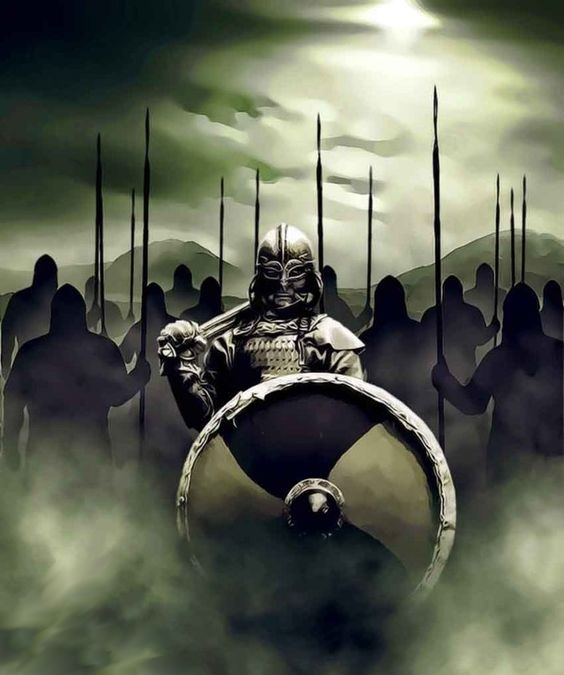
1536: Hesam Jahandar named Count of Hyperborea. Ducal Decree issued to formalize the vast array of sweeping powers possesed by the Duke of Froyalan under the Udal Law to protect individuals from harassment, bullying and other forms of harm inflicted by heinous, unruly and subversive elements. Counts given power to deport individuals from their Counties. Duke names Freyja patron goddess of Elwynn/Froyalan, the people respond by mass-demonstrations; some in favour, some against. Araxion repatriated by Duke Harald. Creation, at the initiative of Duke Harald, of the Baronies of the Elw, Fórntida Kærleikalanden, and Opplysta Smørvirket by the Landsraad.
1537: Duke Harald becomes the Baron of the Fórntida Kærleikalanden. Richard Lyon is appointed Baron of the Elw, Nathan of Natopia is appointed Baron of Opplysta Smørvirket.
1539-1542: The Duke is largely away from Froyalan, fighting in the war over Bosworth - which is known as the War of Jeremy's Nose/Redoubt Island War/Gascon Campaign and in which the "Elwynnbrigaden" defence force plays a key part - for which he was awarded the title King of Bosworthians by Kaiser Hasan I.
The Froyalanish Era is one of the most significant periods in Elwynnese history.
It all started in the dark days of desolation which are known as the Great Famine of Elwynn when Kaiser Mors V - who was spearheading the renaissance of Shireroth - turned to Count Harald of Wintergleam, the last remaining high noble in the Lands of the Two Sacred Rivers, who was seen as the only chance to fight the chaos zone that the Duchy of Elwynn had become, and after His Niftiness was advised by Count Harald that he was willing to ascend the White Orchid Throne he named him Duke of Elwynn.
Quite shortly after ascending the Ducal Throne of Elwynn, with the encouragement of the Kaiser and to give it a fresh start, Duke Harald changed the name of the Duchy to Froyalan. Duke Harald then embarked on a forceful campaign to fix his Duchy's ails and woes in which he picked it up, shook it up, turned it around, and forged it into something new - policies which did not came without opposition.
Those policies, though, bore fruit quickly. The famine was ended by food shipments from Gascony as well as Port Chloe and the Providence Plantations, the prohibition of grain exports to the Kingdom of Babkha, and the introduction of new strains of the staple food-crops without susceptibility to blight. A security force with Duke's Harald's Huskarls at its core managed to restore law and order by jailing, executing, and driving out of the country the innumerable criminal gangs, warlords and other thugs who were rampaging across the country in the absence of the harsh central authority previously maintained by the Babkhi khans and amirs. Tapferite and proto-Froyalanish immigration to Froyalan brought advanced technology, funds and other resources into the Duchy - combined with the more effective enforcement of law and order, on a consensual rather than coercive basis - resulted in infrastructure and essential services being rapidly improved, and agricultural and industrial output exceeding the base level achieved by Babkhan led industrialisation in short order and remaining on a steady rise after that. More importantly the retention of the agricultural surplus for domestic consumption combined with the export of manufactured goods produced a positive balance of trade, allowing Elwynn to pay down the debts incurred in the famine relief period with enough capital generated to leave excess revenues which were reinvested into the economy of the urban communities, leading to a growth in prosperity in the Jewel of Many Facets that was for the first time felt by the Elw themselves rather than the aristocracy or foreign business interests. Many were the Elw who could afford for the first time, in their elevated positions of stewards and foremen and yeoman farmers, the fruits of material success that their ancestors would never have known. It marked the first significant instance of a domestic, consumption orientated, middle class.
Aside from getting the Duchy on its feet again and letting it grow rich, Duke Harald's Reign, especially the renaming of the Duchy to Froyalan and the upsurge of Vikingness - which was deeply permeated in his rule - had another tremendous and lasting impact on the Elwynnese Nation, for it caused all segments of Elwynnese society to soul-search what it is to be Elwynnese. Ironically, and very much to the dismay of Shirekeep, renaming Elwynn into Froyalan only fueled Elwynnese nationalism further. Another example of this is the adoption of the Asgard Calendar - designed to allow the duchy to move away from the ASC Calendar - which spurred the Elwynnese into developing a calendar of their own, which resulted in the creation of the Elw Calendar.
The wild debate that his reign brought, inspired Duke Harald to organize the Løgting of Froyalan, which in effect evolved to an Elwynnese legislature until the end of the duchy. He is also remembered for the significant corpus of law that was established by him and his creation the Løgting, which after his reign became the Council at Eliria and was the predecessor of future Elwynnse legislative assemblies such as the Senate of Elwynn and the Royal Parliament.
So the Elwynnese of today have him to thank for their history of indigenously led organized government (with legislatures, corpus' of law drawn from domestic rather than Babkhan or Shirerithian Imperial law, etc), and for bringing an elevated sense of patriotism which transcended political and ethnic divides, to bring many to express through, various forms of cultural media, a deep love for their country that continue to be a source of interest to contemporary society. It remains uncontested that the Froyalanish community looks upon this era - which is known among them as the Nine Years of Gold - with a strong fondness and nostalgia, marking their highest ascendancy before the elevation of Elwynn to a kingdom.
Upon his abdication, which came quite unexpectedly, Duke Harald was showered with praise for the excellent job he had done during his near-decade at the helm of the Froyalanish ship of state through his wise and benevolent policies, presiding over the expansion of Froyalan into Shireroth's largest and most active Duchy. During his long Reign - at the time the fourth longest Ducal Reign - he had also managed to keep his duchy - with many disparate ethnicities - stable, peaceful and prosperous, something which was viewed as a great feat.
Another great feat by him was the reclaiming of Araxion, which Shireroth had bargained away in the Atkins Reduction one-and-a-half decade earlier, succesfully taking on a belligerent mob of outlandish haters who regarded Shireroth as a land-hoarding behemoth and who used every trick in the book to thwart his attempts to claim Araxion back for the duchy, but the haters were skillfully outmanouvered by Duke Harald and those most sacred lands of the Tower County finally returned, after so many years in the desert, to the bosom of the White Orchid Goddess.
His valor, feats of arms, and other successes in the War of Jeremy's Nose, including the deposition of King Dominique of Bosworth and the seating of Kaiser Hasan on the Throne of Bosworth, made the people of the Lands of the Two Sacred Rivers feel quite proud of their Duke. For the aforesaid exploits in the War of Jeremy's Nose Duke Harald was granted the title of King of the Bosworthians by Kaiser Hasan, a title which he bears to this very day.
Although the Duke Harald was during his Ducal Reign a bit too controversial of a figure to be considered a popular Duke, he upon and subsequently to his abdication - very unlike other rulers of Elwynn who are scarsely remembered - grew steadily in appreciation and reputation for the peacefulness, stability and prosperity of the era he presided over - something which Elwynn did not again experience until the ascension of his grandson the Storjarl Thorstein Noah to the White Orchid Throne. The aforesaid culminated in him being created Elwynn's Patron Saint in the year 1624.
2nd Babkhan Era
1542: Duke Harald abdicates, Kaiser Hasan (Hesam) succeeds. Elwynn is restored as name of the duchy. Hasan is shot by Ardashir in Ardashirshahr, Rashid Andelarion succeeds as Kaiser Ayreon. The episodic Ayreon- Loki Civil War that will define Elwynnese public life for the next sixty years begin over the disputed succession to the Golden Mango Throne. Initially the Ayreonist faction prevails. Byzantopol, a city founded by Jahandar exiles employed by Automat Inc. emerges in Bjorngard as a self-regulating polity (robocracy), a precursor to the Raikothian system of Oracles and the modern Coordinated State. Some consider this to be rather disconcerting.
1542-1543: The Kai Aphmyarkaiph, a Hyperborean military campaign which resulted in the destruction of Babkhi political power for a generation.
Early Modern Era
1543: Wil Nider made duke.
1544: Kaiser Ayreon commits suicide.
1545: Kaiser Loki III appoints Scott I of Hyperborea Lord Protector of Elwynn.
1546: Iskander Mirkdale named duke of Elwynn. Løgting becomes Council of Eliria.
1550: Uprising against the Duke, "White Lily Revolt"
1551: Year of the Four Dukes (Iskander Mirkdale, Jacobus, Rai Avon-El, Andrew Allot). Ayreon finally buried at Cape Farewell. People's Academy established.
1552: Alumelith massacre (Ohl'Tar)
1553: Ohl'Tar Revolt
1554: Causality War sees the use of the "Narrativity Bomb" on the Ohl'Tar infestations in Agnesia and the final extermination of that species.
1555: Duke Nathan leaves throne to Leo Fenrir. Amokolia war affects Elwynn.
1556: Ocia bombs Caligae and Civitas Nova.
1558: Leo abdicates in favour of Isabelle Allot.
1559: Isabelle Allot abdicates in favour of Cho'gall.
1560: Eliria is temporary war capital of Shireroth
1562: Duchy of Elwynn destroyed by Kaiser, house system implemented, House of Kalir founded, Daniel Kalirion (former Duke of Brookshire) named patron.
Independence
1567: Declaration of Independence of Elwynn. Daniel Kalirion named president (raes) of the Elwynnese realm.
1568: Ardashir blows the Elwynnese Congress up in protest at the slow pace of negotiations with Shireroth and also at Lord Erion's continued retention of his own limbs.
1569: Independence recognized by Shireroth in peace treaty, Shireroth reclaims East Elwynn.
1570: Lord Erion elected President.
1572: Amokolia issues its Midnight Declaration, leaves Victoria and joins Elwynn.
1573: Elwynn and Hurmu merge to become Realm of Elwynn and Hurmu. Provisional government and elections. Persecution of Butter Cow followers in East Elwynn.
1574: Daniel Kalirion elected Prince of Elwynn and Hurmu.
1584: Kolmenitzky embassy crisis. Ardashir rehabiliated by Senate.
1585: Natopia becomes Elwynnese protectorate.
1586: Daniel Kalirion is assassinated at Cape Farewell. Nathan is elected Prince.
1587: "Elwynn, Amokolia and Hurmu (Riqi Adurellion" becomes "Union of Elwynn, Amokolia and Hurmu."
1588: Daniel's son Elijah becomes Kaiser of Shireroth as Kaiser Ayreon II, married Prince Nathan of Elwynn.
1589: Renegade Emir of Sathrati, Kaspar Soleiman, took the Elwynnese Senate, the Prince of Elwynn and the Kaiser of Shireroth, hostage in the Senate House of Eliria Castle. Prince Nathan was caught in crossfire during a poorly coordinated hostage rescue operation mounted by the Union Defence Force and Babkhan commandos. The operation descended into a three-sided fire-fight between renegade Babkhan mercenaries, Babkhan special forces and Babkhan trained Elwynnese soldiers, all sporting similar uniforms and the same equipment. By the time order was restored, the Prince was mortally wounded and Eliria Castle was ablaze. Kaspar was taken alive and extradited to Babkha, where he was personally beaten to death by the Grand Vizier for bringing disgrace and shame to the name of Farzan Shahanshah, their Lord the Radiant Sun.
1590: Elijah Ayreon elected Prince of Elwynn. "Union of Elwynn, Amokolia and Hurmu" becomes "Elwynnese Union"
1592: Elijah Ayreon declines re-election, Aaden Allot elected prince. Normark joins the Elwynnese Union. Raspur Pact signed.
1593: Nau is adopted by Elijah and Nathan.
1594: Aaden Allot impeached and removed, Luix Rakira ruling Steward. Air Mango incident, bombings in East Elwynn and the Absentias.
1595: Elijah Ayreon elected Prince once more.
Re-unification
1597: Albion admitted as UT. East Amokolia Act reduces Amokolian UT's territory and gives it to Elwynn proper. Elijah Ayreon declines re-election, Tarjei Einhornsson elected Prince against Jacobus Loki but Constitutional Coup backed by Shireroth sees the Usurper take power instead. The people of Elwynn protest against re-unification, but Loki gathers enough political support to pass the required bill in the Senate. A group of Senators who previously supported Tarjei Einhornsson refuse to recognise the re-unification as lawful, but are quickly overtaken by the harsh reality.
1598: Omnitree Group nationalized by Govt. Mass protests. Normark declares independence. Elijah Ayreon murdered by Sisera in Wahlstadt. Steward Jack Lewis, a staunch opponent of re-unification, attempts suicide and slips into a coma. Misguided messianic cults begin to proliferate.
1599: Hurmu independence from Elwynn.
1600: Treaty of Unification with Shireroth ratified, Soreaa Isurui made Secretary of the State in the provisional government. Tirlar, Albion and Amokolia made independent.
1601. New constitution enacted. Deimos Jasonides elected prince. The Ayreonist Independence Party is formed as a protest against the re-unification. Jack Lewis returns to the national stage as its first chairman. The party does suprisingly well in the first Congressional elections after the re-unification.
1602: The Cabbage Plague sees the ecology of the lower reaches of the Blue and White Elwynn Rivers devastated. The Red Elwynn becomes utterly devoid of life. Owing to the high levels of accumulated toxicity, the populations of Shirekeep, the Imperial County and the County of Lesser Zjandaria rapidly succumb to an aggressive strain of the Barentsz-Melang Syndrome (Brassicosis) previously only documented in Leng and the Absentias. "Triumph of Rrakanychan" painted by an excitable Batavian artist based on lurid eye-witness accounts; southern regions of the State of Elwynn destabilised and the Quarantine enforced by General Royston Merrick necessitated increasing military interventions into the Imperial County.
The Coordinated State
1603: "Restoration of the People's Government", congressional elections follow an unsuccessful putsch staged by Merrick, the first - self-styled - Conducător.
1604: Constitutional Coup by Stewardess Soreaa Isurui. Deimos voted out , Nathaniel elected prince.
1605: Nathaniel/Soreaa deposed, Coordinated-Government instituted by second Conducător Daniel Simrani-Kalirion, Nathaniel remains nominal prince. Constitution is placed into venerated-occultation and replaced by the Charter of Coordination. The Counties are replaced by 182 Bailiwicks with authority devolved to Governors and Municipal Guild Corporations supervised by Wardens in Elwynn Proper and the Marches (Northern, Eastern and finally Western). Communism declared and the State refuses to recognise or accept transactions in fiat currency. Private wealth and ownership permitted to continue.
1606: Remaining Corporations nationalised. All private wealth confiscated and remaining money withdrawn from circulation and effectively outlawed. Black Market proliferates.
1607: Nathaniel declared dead. Daniel Simrani-Kalirion elected Prince. Purges of the Guild of Aldermen by the Court of the Prince and the Court of Star Chamber target the last remnants of the landowning feudal gentry and the formerly capital owning bourgeoisie. Replaced by elite technocratic leadership cadres chosen by merit. Charles Froughton made subject to Pastoral Care Order and dies of an unexpected heart attack. Disorder in the Bailiwick of Fieldberg.
1608: Third Congressional Elections sees Nationalist & Humanist Party remain the largest party but lose overall majority. Coalition negotiations begin. Court of Star Chamber begins reviewing suitability of congressmen elected to represent Conservative & Republican Party. The Kingsgate Treaty of Non-Aggression and Cooperation signed between the Coordinated State and the neighbouring Duchy of Goldshire on Eljere, 11 Elroqpinu 1608.
1609: Beginning of the Icebear Rebellion. The Theocracy of Elwynn is declared. Icebearian troops march to Eliria and briefly besiege the city. Martial law declared on Ermure the 10th of Vixaslaa, 1609 and UDF troops swiftly crush the rebellion on the mainland and captured the most prominent Icebearian leaders, including Jaqen X'halar and Tom Cruise. Coordinated State offices ransacked in the Cimmerian Isles, marking the beginning of the Cimmerian Conflict.
1610: The Holy Church of the Divine Icebear is banned. High Priest Jaqen X'halar dies in prison. The Cimmerian Conflict continued, straining the ability of the UDF to pacify islands beset by rebellious religious groups and rogue transhumanists. With the burning of the town of Ursulabýr on the Cimmerian Island of Snowhawk the authority of the Coordinated State was confined to the Bailiwick of Wolfraven.
1611: The Coordinated State issues a ban on money. Capitalist protests break out all over Elwynn. Aasmund Vigeland, an obscure Norse colonial born in Zanzibar in 1581, began his rapid - some might say preposterous - ascent through the ranks of the UDF, sponsored by elements within the regime who sought to strengthen the Norse faction of the armed forces at the expense of the Babkhi.
1612: After losing the confidence of many in failing to restore order in Cimmeria, Steward Tokaray al-Osman was overthrown and exiled. The successful putsch was organised by the Panopticon Department and the Cabal of Government, led by three UDF generals; Laqi Hyrrion, Danyial Dravot & Brigadgeneral Fredrik Anders. It was widely suspected at the time that the coup was at least tacitly supported by Simrâni-Kâlirion and Councillor Deimos Jasonides, alarmed at the power being wielded in Elwynn by the Babkhi.
The Communist Revolution
1612: A deranged Amokolian assassin made an attempt on the life of Kaiser Mo'll I, merely damaging the feral ghoul he kept as companion. This horrible diplomatic faux-pas, whilst quickly resolved, gave the Cabal of Government the opportunity to publicly announce the removal of Dr Tokaray al-Osman, owing to 'strain'. Aasmund Vigeland, a Norse populist and UDF veteran, rose to prominence as Steward of Elwynn after the hospitalisation of Dr Tokaray al-Osman. The Cabal of Government, seeking to capitalise on the propaganda campaign by which they had elevated Vigeland's profile and advanced him to high command within the space of a few short years, orchestrated his appointment to the stewardship.
1613: Emboldened by the decline of the Nationalist & Humanist Party and infighting amongst the regime leadership the Elwynnese Workers' Party declared the Prince to have been hospitalised in a sanatorium and in a bloodless coup replaced the Coordinated State with a Democratic People's Republic. Vigeland declared the revolution to have occurred on Emure the 10th of Laemill, but in practice the defection of the Panopticon Department to the Workers Party meant that the transition had in effect begun weeks earlier before anyone had realised. celebrated his success by proclaiming himself Chairman of the Presidium of the Standing Committee of the Supreme Council.
1614: Dr Tokaray al-Osman escaped from the Dragonsfold Contentment & Wellbeing Clinic attached to Dragonsfold Gaol. In keeping with the traditions of the Coordinated State, it was believed that his supervisors, or rather his captors, were seeking via guided counselling to discuss with the Doctor the various misdeeds of his life and the consequent pressures of guilt that he might - they would suggest - be feeling. When individuals in counselling or subject to preventative detention begin to suffer from acute emotional distress that amounts to suffering contrary to their human dignity it has often been the case that the State was willing to - reluctantly - offer euthanasia for the patient. It is not known for sure whether that offer was extended in this instance, but evidently the discussions held on that ward had a profound effect on al-Osman. So profound in fact that he was inspire to the point where he paused only to dig out the heart of his psychiatrist with a spoon before carving a bloody path to freedom leaving a dozen dead and a riot in his wake. Little is known of his subsequent movements save that they point through a trail of accounts of arson, assault and larceny towards an escape into the badlands of Western Benacia. There, rumour has it, he was subsequently been spotted in the company of a minor bandit known as Sighvat, an individual who primarily subsists by raiding small Tellian communities in the Vale of Angularis and is unlikely to ever amount to much.
1620: Aasmund Gudmundssønn Vigeland was openly assassinated in Shirekeep on the orders of Isa IV Cassandrae, Kaiseress of Shireroth. To this day, nobody knows why, although it was most probably a belated realisation on her part that an avowed revolutionary was a poor choice of Steward for the Imperial Republic.
If the Coordinated State had some redeeming features on account of its ruthless efficiency in combating enemies, foreign and domestic, and in countering the catastrophic ecological consequences of the Brassican Crisis, the Democratic People's Republic was an unmitigated fiasco. After a few years of continuing the worst aspects of the preceding regime's economic policies combined with a boilerplate Marxist constitution and an uncompromising stance of enforcing atheism on all national communities within the State, it came as no great surprise that the leading communists finished their days in His Serenity's Prison Dragonsfold - kept alive to witness the moment that an absolute monarchy possessed of the most literal belief in the divine right of kings, was instigated. A most stinging rebuke for their reckless folly in destroying the work of generations in the pursuit of Utopia.
